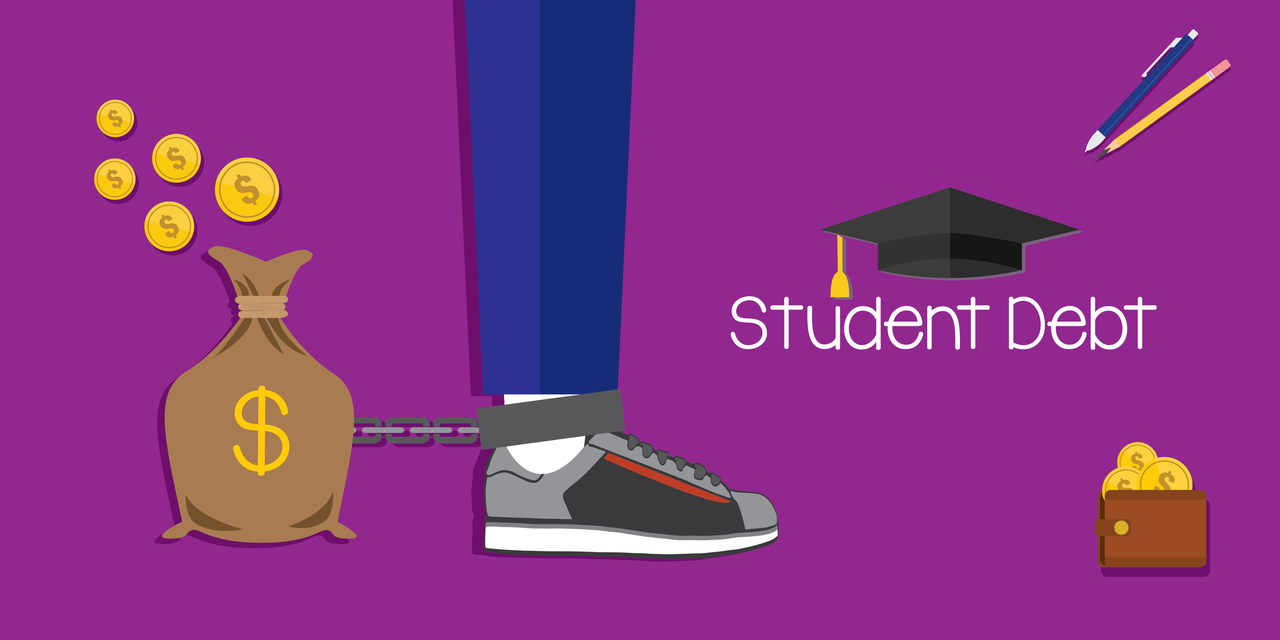4 Smart Ways to Find Money to Invest, Pay Down Student Debt And Reach Financial Independence.
Student loan debt is a crisis in America. According to an article published in LenEDU, nearly 45 million people owe a combined $1.52 trillion in student debt. This unfortunate situation puts undue burden on student debt holders. "To pay off student loan debt first or to invest and save for retirement", that is the question English poet, playwright and dramatist William Shakespeare would ask, were he alive today. This is certainly the same question many student debt holders struggle with today. In this article, we opine.
Student loan interest rates vs stock market historical returns
It's hard to save for retirement, when your whole body is shackled down by student loan debt. You just can't move; it's a dilemma. To tackle this conundrum, it is wise to take a look at the average student loan interest rate and the stock market's historical returns. According to Credible, the average federal student loan interest rates for undergraduate and graduate students for 2019-2020 was 4.53% and 6.08%, respectively. LenEDU, a website that helps consumers learn about and compare financial products, including student loans, puts the average private student loan amount from 2016-2019 at $13,780.40 (see below).
On a different note, the stock market has historically returned an average of 10% annually, according to NerdWallet. From 1973 to 2016, the S&P 500 has returned 11.69%, according to The Balance. If you don't invest early, you will miss out on potential stock market compounding returns. Here are 4 few ways to find the money to simultaneously invest and pay down student debt.
1. Refinance and save money.
Refinance your student loans to "create" money and decrease your interest penalties. A person with a $50,000 student debt balance at a 7.00% interest rate is paying approximately $9.60 per day [(50,000 x 0.07) / 365.25)] or $288.00 per month in interest (9.60 x 30). Let's suppose that same person refinances for a relatively lower rate, say 5.50%. She is now paying $7.50 per day or $225.00 per month in interest. That's a saving of $63.00 per month or $756.00 per year! This newly-found money can be used towards investing. We recommend you refinance with SoFi to find more money to invest.
2. Take advantage of your employer's free money.
A 401k is a great way to invest in the stock market and save for retirement. You must contribute a certain amount, in order to obtain your employer's matching contributions. That's just free money! For people who may not have access to an employer-sponsored 401k retirement account, Roth and traditional IRAs are two solid tax-advantaged alternatives. Contribute often; even the smallest amount will go a long way towards helping you improve your financial future.
3. Bargain with your student loan servicer.
"Ask, and it shall be given you." If you are trying to find that little extra money to invest, consider asking your student loan servicer to reduce your monthly payments. It doesn't hurt to ask. Most student loan servicers will grant your request. Once your plea is granted, use that "extra" money to invest in your future and enjoy stock market returns.
4. Get a side hustle and earn a little extra.
One of the benefits of living in America is the widespread availability of side hustles. A side hustle allows you an opportunity to earn extra money. You can use that extra money not only to reduce your student debt but also to invest and save for retirement. A very popular side hustle is driving for Uber or Lyft. Nitro has compiled a list of the 11 best side hustles to help you earn extra money.
The bottom line
Should you pay down student debt first and save for retirement later? Whereas some may advocate for paying down student loan debt as swiftly as possible, others will argue for the latter. While both approaches have advantages and drawbacks, we prefer a more balanced approach. Paying down debt and investing for retirement require considerable effort. If you follow the tips outlined above, you can decrease your student debt burden, while you significantly build your retirement nest egg.
Subscribe below to get our latest articles. Here are a few other articles you may find useful: How investors make money in the stock market | Stocks vs. index funds vs. ETFs: differences and similarities | I heeded Warren Buffett's advice. I can't stop winning | 2 simple reasons why you don't need bonds in your portfolio | 4 reasons why you should fire your broker or robo advisor.
Related Posts
Comments
By accepting you will be accessing a service provided by a third-party external to https://www.newvestor.com/







